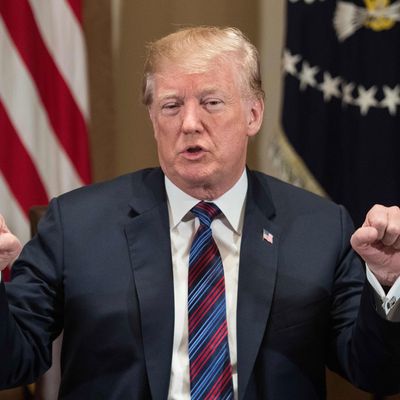
“My father’s no different than any other powerful man,” says Michael Corleone, “any man who’s responsible for other people. Like a senator or a president.” This line in The Godfather may be meant as an arch critique of American democracy, but it also reflects the deep human temptation to excuse our failings by drawing upon, and then exaggerating, the flaws of others.
The Trump presidency has exerted a gravitational pull on the conservative intelligentsia. On one flank, the rise of Trump has set off the exit of a coterie of right-wing voices like Bill Kristol, Charlie Sykes, Bret Stephens, Michael Gerson, Peter Wehner, and other former conservatives in good standing. They have been replaced on the opposite flank by an influx of commentators previously deemed too kooky or racist: Alex Jones, Bill Mitchell, Milo Yiannopoulos, and the alt-right crowd.
But the vast bulk of conservative commentators have neither left nor entered, but find themselves in the same position. After greeting Trump with near-uniform revulsion, conservative intellectuals have mostly swallowed their doubts and reconciled to the new party leader. Their predominant tone is not worshipful (as it was, for the most part, during the Bush administration) but resigned and cynical. Trump is a flawed man, they recognize, but they insist he is no different than any other powerful man.
This form of argument occurs every day, but a few recent examples give the flavor of the new routine:
1. National Review’s Jay Cost: “Regarding the assault on the rule of law, Trump’s approach to Robert Mueller’s investigation is more or less a re-creation of Bill and Hillary Clinton’s strategy from the mid-1990s.”
2. Former George W. Bush press secretary Ari Fleischer, describing the hostility between Trump and the mainstream news media to a Politico reporter: “This is what happens when two parties are at war. But like two combatants in a war, all the civilians can do is shake their heads. The issue of who fired the first bullet doesn’t really matter anymore. It’s just a war.”
3. Wall Street Journal columnist Holman Jenkins: “You can be a nonfan of Mr. Trump; you can believe he’s peddling a conspiracy theory about FBI and CIA actions during the campaign. But every president has a duty to fight to protect himself and his power. And notice that his conspiracy theory is but the mirror image of the conspiracy theory that his political, institutional, and media enemies have been prosecuting against him since Election Day 2016.”
Several enduring facts of political life give these kinds of equivalences some superficial plausibility: Nobody is perfect and flaws abound on all sides; parties have spent years locked in combat developing self-justifying narratives; and new forms of political combat have at least superficial resemblance to old ones.
And so it is easy for conservatives straining to find their bearings to draw some parallel between their new leader and their old enemies. The parallels, of course, are absurd. Fleischer systematically misled the news media or evaded reporters’ questions, but his mendacity never approach the bald-faced, obvious fabrications of a Donald Trump, who has admitted that he considers all negative stories to be inherently “fake news.” The Clintons criticized Ken Starr, but their influence was aimed solely at public opinion; they did not conduct a pressure campaign to violate Department of Justice procedure and obstruct his investigation. And the Clintons certainly did not believe that the attorney general ought to, as an ethos, prosecute the law for the president’s political benefit.
And even if you are skeptical about what Mueller will turn up, Jenkins’s notion that his investigation of Trump’s campaign is based on a “conspiracy theory” ignores massive amounts of public evidence, ranging from multiple publicly known episodes of Trump campaign officials soliciting stolen Clinton emails from Russia to a growing list of indictments. Even a staunch right-winger like Trey Gowdy concedes the FBI had sound basis to launch its counterintelligence probe.
But the surrendering of any capacity to distinguish between ordinary political tactics and Trump’s extraordinary breaches of political norms collapses all standards. All that remains, in the absence of any principled distinctions, is raw power. The contest between a news media that tries to convey some version of objective reality and a president who willfully creates an alternative reality for his own ends is “just a war,” in Fleischer’s revealing words. As Jenkins puts it, “Every president has a duty to fight to protect himself and his power.” It follows that whichever steps Trump takes to maintain his power are implicitly normal and justified. This is the moral logic of a gangster, and also of the bulk of the ruling American political party.






























